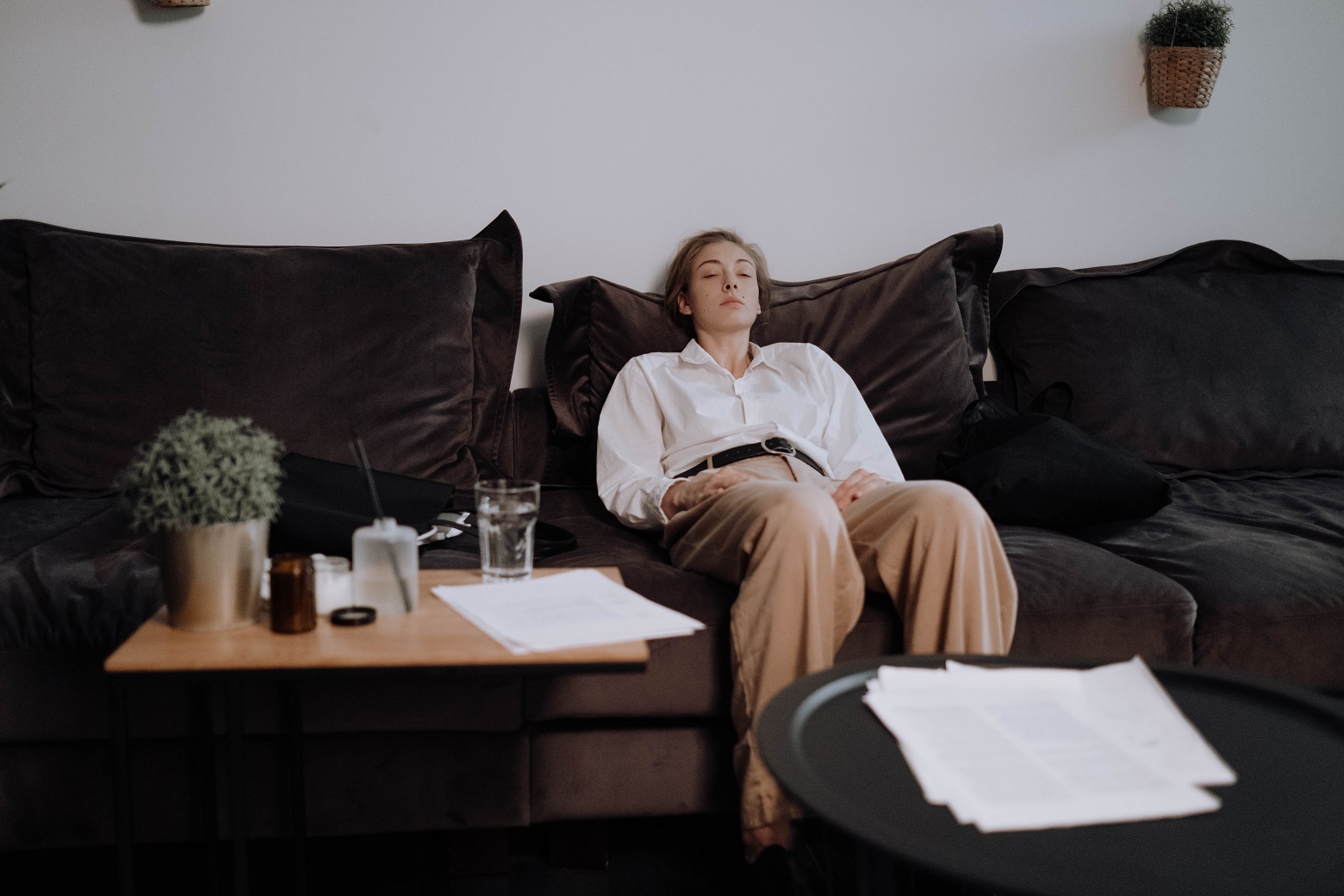
By: Alli Hill
I will never forget the panic I felt when COVID closed the schools. My kids were officially at home six hours more each day. My writing clients got louder and more demanding. I suddenly had twice as much work (career and household) and zero help. My husband was still working (because cabinet manufacturing was somehow essential) and we couldn’t put the grandparents at risk. The energy at home was a never-ending roller coaster. And yet, I found ways to make it all work.
Having been a freelance writer for 6+ years, I was no stranger to working from home. It’s not like I was suddenly thrust into an alien situation like many others were. I had an amazing sitting/standing desk and ergonomic chair. My desk was decked out with essential oil diffusers, a second monitor, sensory playthings, and a scary-looking acupressure mat for my neck and back. You know, all those things that people who work from home apparently need!
Those things put on a great show. But as for protecting my energy (my mindset, my emotions, my productivity, and my overall sense of well-being) when working from home – that was a whole different challenge I had to figure out, and fast.
Here’s what I did (and continue to do) that might help you, too.
1. Fixate on yourself first.
I was working against so many things during COVID: kids being home from school and still needing to learn. Preparing more meals more times per day. More laundry and dishes. More client work. More housework because kids are home more often. More noise. All I wanted was “less”.
But I couldn’t control any of those things. The only thing I could control was how I handled the situation. And that’s something I think about just about every day now.
Protecting my energy at home starts with me. It’s how I react to things, how I think about certain situations, and how I solve problems. Protecting energy means making the right choices and choosing the right mindset that will help me do this.
I realized that any time I reacted badly to something, it was my ego at work. I knew that if I could make some changes in myself, my world around me would change too. So I started letting some things go. I stopped obsessing over schedules and bedtimes and schoolwork and perfectly balanced meat-starch-veggie meals. I reminded myself we were all just surviving. And I learned to be okay with that.
I carry these things with me now, too. Kids are back in school, youth sports are in full swing, and we live an abundant life. So if Ryan doesn’t finish all his homework or Kenzie is five minutes late to dance class or I miss one grass stain on Ryan’s baseball pants, etc., it’s all going to be okay. Life is messy and little things don’t deserve my attention all the time.
2. Set clear boundaries.
My workday doesn’t follow the average workday. Sometimes, my work carries me into the evening hours after dinner. Sometimes, I work in my car while my daughter dances and tumbles. And sometimes I work when the kids are home from school.
That’s all okay by me, but it also needed to be okay with and accepted by my family. They needed to understand why mommy couldn’t just stop mid-typing to tie a shoe or answer a question.
Boundaries are your best friend when protecting your energy at home. You don’t have to be available to others all the time, whether it’s your clients or your family.
In my case, I let my family know when I’m getting on a call or diving deep into something that requires my focus. I will tell them to take their complaints to their dad for a while or tell them they will have to wait until I am done before I can help them (with minor exceptions, like if they’re hurt or the house is on fire). The more I stick to my own boundaries, the more they do, too.
3. Be honest with your feelings.
Ever had someone point out that you’re in a bad mood? For me, that just makes it worse. It feels like a personal attack.
And yet, too often I don’t acknowledge my own feelings. I need to be the first one to tell myself that I’m in a bad mood or feeling some kind of way. I certainly don’t want any negative feelings to transfer to my clients.
Be honest with your own feelings so you can acknowledge them, validate them, and find a way to let them go. The sooner you recognize you’re stressed, overwhelmed, or whatever it may be, the sooner you can readjust your thinking.
4. Reframe your negative thoughts.
We all have negative thoughts sometimes. I had a lot when I was working from home in the early days of COVID and having to teach and care for two school-aged children. The schools closed during my birthday week. I had big plans that week and pretty much all of them got canceled. I was feeling resentful and asked “Why me?” a lot those days.
It wasn’t the birthday week I imagined. I actually ended up working on my birthday because I had so much to do. But I didn’t like feeling negative, so I chose to focus on the positives.
Having the kids home meant I could spend more time with them, even though I also had to work and do a bajillion things. I felt thankful my husband could still work too, especially seeing so many others laid off. I loved knowing that I was doing my parents a favor by not seeing them, even though we missed them terribly.
Reframing your thoughts isn’t easy. It takes a LOT of practice. Introspection was a big help, allowing me to find my triggers, be more mindful of my thoughts, and figure out what I could avoid in order to maintain my energy at home.
I found the more I practice reframing, the easier it became. Now, it almost comes automatically. The silver lining is easier to find when you’re always looking for it.
5. Clean.
Physical clutter creates mental chaos for me. I’ve always appreciated a clean and tidy space, and hiring a housekeeper once per week has been some of the best money ever spent. But with two kids at home, it doesn’t stay clean for long. Instead of focusing on the fact that two little tornados are going to rip right through my hard work within 24 hours, I focus on the peace of mind it gives me. I try to hold onto that feeling for as long as possible, even if visually my house looks like a shipwreck.
Cleaning is one of the ways I protect my energy at home. I try to keep things orderly and organized. It’s practical (I can find things more easily) and it reduces distractions so my mind stays focused on work.
I’ve found I don’t need tons of free time to do this, either. For example, I clean as I go while cooking. I’ll spruce up the bathroom while brushing my teeth. Those little pockets of time make a big difference in how my house looks and feels, and that has a positive effect on my mental health.
6. Work outside.
There’s nothing like a change of scenery to protect your energy while working from home. Maybe you’ve been stewing inside your office and now it’s filled with bad vibes. Or maybe all the shouts and screams from your children are echoing down the hall and ruining your concentration.
That’s why I like to take my work outside. I have to find a shady spot so I can still see my laptop screen. But outside, the kids can be as loud as they want and none of their craziness lingers in my office. If I’m giving off bad vibes, they can catch a ride on the wind instead of being bottled up in my home.
Plus, I get a dose of Vitamin D, sunshine, and fresh air. Nature does wonders for the senses and can put you in a better mood almost instantly.
7. Make protecting your energy a family activity.
I used to try to protect my energy at home by taking a break from my family. But I’ve come to realize that they need to protect their energy, too. That’s why I now try to make it a family activity.
For instance, we’ll exercise and stretch together. When I need a mental work break, I’m playing a game with my kids instead of scrolling on Facebook.
Love is the most powerful way to protect your energy at home. I don’t try to balance my work and family lives, but rather try to entwine them. I no longer have to fight to find the line between the two. And I think we’re all better off this way.
Bio: Alli Hill is a freelance writer, full-time mom, and founder of FreelanceSpeak. When she’s not writing for clients, she is coaching other freelancers on growing their profits, speaking at events, or traveling to the mountains with her family. Connect with Alli on LinkedIn.
